 I was born in New York City, in the borough of Brooklyn, and grew up in Great Neck, New York, on the north shore of Long Island. Long Island contains two of the five "boroughs" of New York City, and then Nassau and Suffolk counties to the east. But after coming to the Boston area to attend college, I stayed on, and Massachusetts became my adopted state. Note 1 Counting my college years, I've now been here for over fifty years, yet it's not uncommon for people to recognize my New York accent. The Boston area provides many of the advantages of New York (cultural, culinary, educational, etc.), while being in some ways a more livable city (much smaller, less traffic, and so on). An aunt and uncle of mine probably couldn't live in the United States outside of New York City, where they generally attended several concerts, plays, or other cultural events each week. They had season opera tickets, and no doubt would have found the number of operas performed in the Boston area to be insufficient for their needs. But for me, the cultural offerings of the Boston area are more than adequate.
We lost electricity for about five days, and citizens were restricted to only essential driving while the Commonwealth cleaned up. Needing fresh food to cook on our camping stove, we made a trip of about two kilometers (about 1.2 miles) to Collin's Market. The owner had managed to get to the market early in the storm, and was able to keep it open. Since all but essential driving was prohibited, we put Elissa onto a sled, and walked down Route 126 into town. We then pulled our purchases back home on the same sled. The owner of the market thought we were crazy, telling us that we could have used our car. Getting food was certainly considered to be "essential driving".
A group of visitors, potential customers, came to see us from Disneyland, which is located in Anaheim, California, a part of greater Los Angeles. They had the misfortune to visit during a substantial snowstorm, and they seemed absolutely fascinated by what was going on outside the windows of our sixth-floor conference room. Whenever there was a break in our meeting, they ran to the windows to watch the heavy snow fall, and to ask questions. "What's that?", someone said. I replied, "Huh? It's snow." "No," said the questioner, "it's making ticking noises when it hits the window sill." I explained that there was evidently some sleet mixed in with the snow. Then I had to explain sleet. Later on in the meeting, a massive gust of wind came up the hill. The windows roared as if a freight train were passing nearby, and the snow blowing off the tree tops turned our sixth-floor view entirely white. The noise was so spectacular that all conversation stopped. After a brief pause, I broke the silence by saying, "When it turns all white like that, it means the snow has come up to the top of the window." I heard a gasp from one of our Los Angeles visitors. Apparently she had believed me, at least momentarily. It snows a lot in the Boston area, but it never even approaches six stories deep (for that, you'd have to visit Siberia). One of our L.A. visitors later explained to me why they found the snow so interesting. It's not that they had never seen snow. People who live in Los Angeles routinely drive up into the nearby mountains to ski. But they wait to drive until the weather has cleared. They'd all seen plenty of snow. They just didn't usually see it FALLING. The snow was not so amusing to them after our meetings ended. They all had long delays getting out of Boston, and due to canceled flights, some of them had to stay over an extra day.
One of the women from Houston took a quick look at a road map of Massachusetts, and found the town of Concord. She said, "Yeah, we ought to have time to go there in a day." She handed the map to someone else, who began giving instructions to the driver. After about fifteen minutes (they started in Waltham), the navigator said, "OK, we've arrived." The original map reader yelled, "What! Let me see that map! Where's the scale on this thing?" The map showed all of Massachusetts, about 190 Km. (120 miles) wide (that's the long dimension). When she realized how small it all was (on a Texas scale), her mental wheels started turning. "Oh my God," she said, "we can go to Cape Cod. We can go to Cape Ann." And then, as the size of it all sunk in, she said, "We can go to other states!" And they did. They drove to Plymouth Rock, and they drove to Cape Ann (completely the opposite direction). They drove into New Hampshire, and through it, and had a lobster lunch in Maine. I guess when you're from Texas, it all doesn't amount to much distance. Massachusetts has an area of 27,336 square kilometers (10,555 square miles). But Texas is slightly larger than France, at 695,621 square kilometers (268,581 square miles), over 25 times larger than Massachusetts. The original map reader had probably initially assumed that the scale on the Massachusetts map was about the same as the scale on the Texas maps she was used to. Note 3 I knew a woman from Hawaii, who reported sitting on a beach there, and thinking, "Another damn sunny day." That's when she decided she needed to get out, and she moved to Boston. As for me, I like the snows of Boston. They break up our routine, and make life interesting.
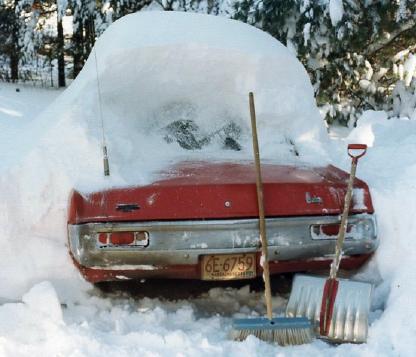 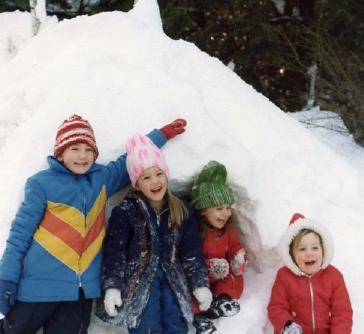
  Note 1: Massachusetts is officially known as "The Commonwealth of Massachusetts". [return to text] Note 2: A friend of ours actually went into labor during the great blizzard. She was taken to the hospital in a series of police cars, one in each town she passed through. Each police car handed her off to the next at the town line. The cars were preceded by snowplows. If you are at risk of giving birth in a police car, a blizzard is not so amusing. [return to text] Note 3: The smallest American state is Rhode Island, abbreviated "RI". At 4,002 square kilometers (1,545 square miles) it's about 0.58 percent the size of Texas. There are ranches in Texas that are larger than the state of Rhode Island, and they measure their size in "RIs". The French equivalent (in a sense) of our "states" are called départements, and, logically, they are approximately the same size. But due to the history of the various American states, they differ vastly in size. The largest state, Alaska, is over 429 times the size of Rhode Island. [return to text]  |
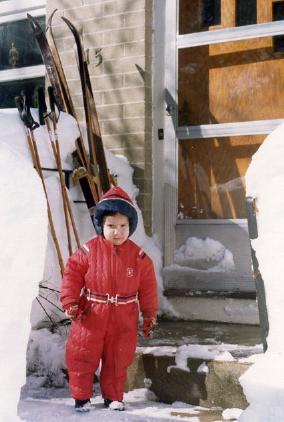 Boston and New York are only about 330 Km. (200 miles) apart, and it only takes about four hours to drive between them. Boston weather is usually a little bit colder and snowier. The photo to the left shows our daughter Elissa in the aftermath of the Great Blizzard of 1978, when she was two years and five months
old.
Boston and New York are only about 330 Km. (200 miles) apart, and it only takes about four hours to drive between them. Boston weather is usually a little bit colder and snowier. The photo to the left shows our daughter Elissa in the aftermath of the Great Blizzard of 1978, when she was two years and five months
old. 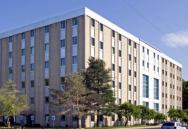 Another story about snow: in the mid nineties, the company I worked for, Kronos Incorporated, was located in a building at 400 Fifth Avenue, in Waltham, Massachusetts, at the top of Prospect Hill. Winds from the west, blowing up the hill, often made the old single-glazed windows creak and sing, even when the wind was moderate. During gusts on windy days, the din could make conversation difficult.
Another story about snow: in the mid nineties, the company I worked for, Kronos Incorporated, was located in a building at 400 Fifth Avenue, in Waltham, Massachusetts, at the top of Prospect Hill. Winds from the west, blowing up the hill, often made the old single-glazed windows creak and sing, even when the wind was moderate. During gusts on windy days, the din could make conversation difficult.
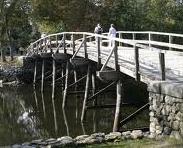 Here's a Massachusetts story that has nothing to do with snow. It's about another group that visited Kronos from out of state, this time from Houston, Texas. Unlike the group I mentioned above, these were Kronos employees, from our Houston office, visiting headquarters for a number of different meetings. They had a free day between meetings, so they rented a car to do some touring. Someone suggested visiting the Old North Bridge, part
of
Here's a Massachusetts story that has nothing to do with snow. It's about another group that visited Kronos from out of state, this time from Houston, Texas. Unlike the group I mentioned above, these were Kronos employees, from our Houston office, visiting headquarters for a number of different meetings. They had a free day between meetings, so they rented a car to do some touring. Someone suggested visiting the Old North Bridge, part
of